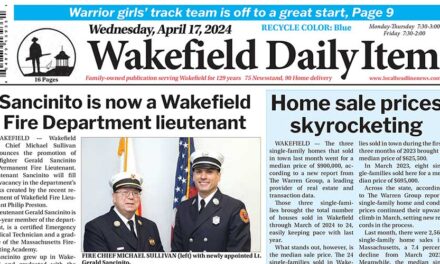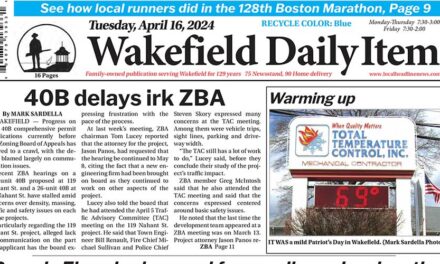By MARK SARDELLA
WAKEFIELD — Speaking for Wakefield merchants and other businesses, the local Chamber of Commerce has come out against a Town Meeting article that would ban so called single-use, thin film plastic bags in Wakefield.
Marianne Cohen, executive director of the Wakefield Lynnfield Chamber of Commerce appeared before the Board of Selectmen Monday along with Laurie Hunt, a member of the Chamber board of directors.
Cohen read a prepared position statement that had been voted by the full Chamber board.
“The Officers and Board of Directors of the Wakefield Lynnfield Chamber of Commerce are opposed to Article 28 on the Town Meeting Warrant, as it is written, which will ban the use of thin film plastic bags. Chamber President Mullen, who serves as Town Counsel, abstained from voting on this matter.
“The Wakefield Lynnfield Chamber of Commerce merchant members, as well as other business owners, have indicated that they would like to be a part of the discussion involving any proposed ban on plastic bags in the future.
“While the Chamber appreciates the thought behind the article, the directors and members also understand the financial burden such a ban would have on the membership, particularly small local business, as well as the challenges of properly packaging items that customer purchase to keep them safe and dry after leaving their shops.”
The proposed ban under Town Meeting Article 28 is the result of a petition signed by 10 voters. The petition was initiated by Caitlin Bracken of Pleasant Street, a 15-year-old student at the Winsor School, a private girls’ school in Boston. She presented the case for banning plastic bans at a Board of Selectmen’s meeting in March.
Article 28 includes a summary of the proposal.
“The purpose of this bylaw is to limit the amount of greenhouse gas emissions, preserve the oceans, protect wildlife, and reduce the amount of trash that ends up on the streets and in landfills by using recyclable, reusable, or compostable bags instead of thin-film single-use plastic checkout bags.”
The article goes on to say, “Thin-film single-use plastic bags shall not be distributed, used, or sold for checkout or other purposes at any retail or grocery store within the Town of Wakefield.”
The proposed bylaw calls for an escalating schedule of fines up to $50 to be levied on merchants for each violation.
Cohen said that the Chamber office has been hearing feedback from its members as well as other businesses in town.
“We decided that as a Chamber we needed to take a stand on this,” Cohen said.
Cohen and Hunt stressed that the Chamber in no way intended to dismiss the work that Ms. Bracken did or discourage her from taking part in the process.
“I watched her presentation,” Hunt said. “She did a wonderful job.”
But Hunt said that the local merchants wanted to be a part of the discussion with respect to any proposal to ban plastic bags from local stores.
Selectman Brian Falvey asked what effect banning plastic bags would have on the merchants.
“Cost is the biggest issue,” Hunt said. “It’s very expensive to buy paper bags, especially paper bags with handles.” Thin plastic bags by contrast cost pennies. “They’re very affordable,” she added.
Cohen pointed out that if the the proposed bylaw were to pass, merchants would have to upgrade to the more expensive paper bags or thicker plastic bags for their customers.




